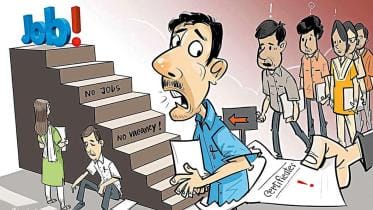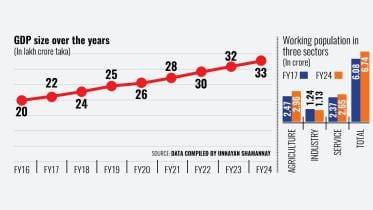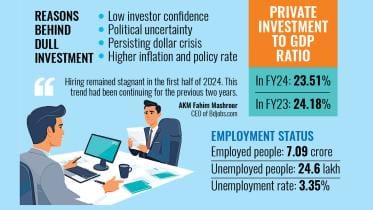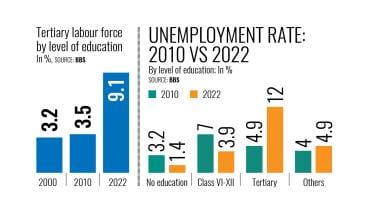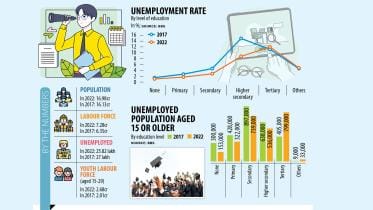unemployment in Bangladesh
Rebutting the rebuttal: On inflation, unemployment, and the Phillips curve
My article, "The interim has failed to curb inflation and unemployment," was published in The Daily Star on Dec 29, 2025. Dr Abdullah A Dewan has delivered a rebuttal to my writing, published on January 4, 2026.
8 January 2026, 07:00 AM
How to bridge education and employment in Bangladesh
Bangladesh's inability to create adequate opportunities for its young population has moved far beyond an economic concern.
10 December 2025, 02:00 AM
A generation left waiting
Govt must address unemployment, particularly among educated youth
2 October 2025, 06:00 AM
One in three graduates remains jobless for up to 2yrs
Lack of investment, skills mismatch fuel high graduate joblessness rate
28 September 2025, 18:00 PM
Bangladesh had 9 lakh unemployed graduates in 2024
Among unemployed graduates, over 20 percent were women
11 September 2025, 18:00 PM
Economy expanded 50% in eight years, but jobs grew only 11%
Over the past eight years until fiscal year 2023-24, the country’s economy grew by more than 50 percent, painting a rosy picture of performance by major sectors, while the expansion did not translate into job creation.
22 July 2025, 20:04 PM
Rising economic risks demand better interventions
Warnings from World Bank should be taken seriously
25 April 2025, 04:00 AM
What was the point of a white paper on economy?
Take proper steps based on its recommendations
20 January 2025, 03:20 AM
What makes Bangladesh's economy more troubled to progress?
There is no certainty that the economic aspects won’t deteriorate further.
9 January 2025, 02:00 AM
Government must focus on creating jobs
Latest BBS data shows a bleak state of unemployment in the country.
7 January 2025, 07:00 AM
Not a good year for job-seekers
Fresh graduates, their faces pale and uncertain, spent 2024 poring over newspaper job advertisements, applying for any suitable position and frantically appearing for recruitment exams in Dhaka.
24 December 2024, 18:00 PM
Bangladesh unemployment grimmer than it looks
The past government had been relying on international definitions and standards that are over four decades old to measure labour data, painting a rosy picture of low unemployment and an improved labour market.
11 December 2024, 18:00 PM
National university graduates: One out of four unemployed
A recent Bangladesh Institute of Development Studies (BIDS) publication revealed that 28 percent (one out of four) of National University students remain unemployed after graduation.
9 December 2024, 19:28 PM
Labour market: A ticking time bomb
Bangladesh has an oversupply of tertiary graduates and the unemployment rate among the educated youth has grown 2.5 times since 2010 as they are ‘incompatible’ with the structure of the industries and the economy, according to the white paper on the state of the economy.
2 December 2024, 18:00 PM
Can we reverse the brain drain?
Create an enabling, inspiring ecosystem for our youth
8 November 2024, 13:30 PM
IMF’s assessment and the real risks for Bangladesh’s economy
Risk assessments of the kind done by the IMF are not usually done by the government, although it would have been desirable.
26 July 2024, 05:00 AM
Industries created more jobs amid slowdown. Economists find it puzzling
However, the findings raised questions among economists, who were puzzled by the growth at a time when the economy had been facing a slowdown due to high inflation, a downtrend in export growth, and falling imports.
7 May 2024, 00:16 AM
Unemployment among men increases
The number of unemployed men increased in the first quarter of this year due to a lack of job opportunities, according to the Quarterly Labour Force Survey (QLFS) released today
6 May 2024, 10:14 AM
Why do university graduates remain unemployed?
The responsibility for the current employability skills gap in Bangladesh is shared by many parties, including students and the UGC.
19 February 2024, 02:02 AM
Unemployed graduates double to 8 lakh in 5yrs
Almost every weekend, residents in Dhaka see a common scene in front of educational institutions: youths are either waiting at the gates to go inside or coming out after taking part in the recruitment tests in their efforts to land jobs.
26 October 2023, 18:00 PM




